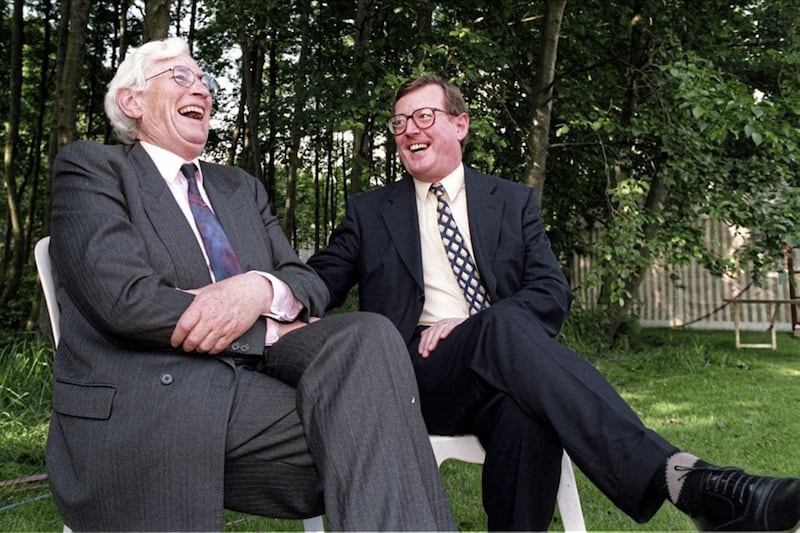"MEANINGLESS! Meaningless! Utterly meaningless! Everything is meaningless."
So goes the opening of the Old Testament book of Ecclesiastes, a snappy 10 pages of what theologians call 'wisdom literature' sandwiched between Proverbs and Song of Songs.
I usually resist exclamation marks with much the same tenacity that I avoid the Christmas market in front of Belfast City Hall.
Yet in this case, the emphasis of the narrator - described as "the Teacher" who, if not Solomon himself, is a figure like him in his wisdom, power and authority - is worth preserving, underlining his despair at life as he meditates on its purpose.
None of this makes it the most obvious Bible text to ponder ahead of Christmas. Yet Christmas, as it is now widely observed, seems to be me to have become essentially "meaningless".
Naturally enough, the Old Testament passages normally heard at this time of year tend to be those that relate directly to Jesus, such as those from Isaiah which prophecy his birth and death.
Ecclesiastes is packed with great lines - "There is a time for everything... a time to be born and a time to die… a time to love and a time to hate, a time for war and a time for peace" - but none of them figure in school nativity plays or church carol services.
From his downbeat opening, the Teacher doesn't really up the barrel of laughs quotient.
The general thrust of what follows is that life - work, pleasure, wisdom, folly, advancement, riches, oppression, whatever else you can think of - is essentially "meaningless".
It isn't that life is futile or incapable of having meaning, but that we aren't able to grasp it; it's like sand slipping between our fingers or, as the Teacher puts it, "chasing after the wind".
Contemplating the purpose of work and toil, at one point the Teacher, with typical melancholy asks: "What does man gain from all his labour at which he toils under the sun?"
The under the sun bit is debatable in our climate.
But were the Teacher to be parachuted into Christmas 2017, Norn Iron-style, he might reasonably conclude that all we want to gain from our labour is a load of stuff no-one really needs.
Or that going to the aforementioned Christmas market is how people celebrate the festive season.
Now, I am fully aware that I can be on the curmudgeonly side of curmudgeonly. But things like the Christmas market make me positively misanthropic.
Friends visiting from London last December had read about the Christmas market as a "must see" on their flight to Belfast, and expressed an interest in seeing whether "the craic" was, indeed, "ninety", as the airline magazine promised.
Against my better judgment, because I knew it would be terrible, we - four adults and three children - ventured to the City Hall on a Saturday afternoon.
It was what one might call an immersive experience. Lowlights included several fights, including one that broke out near the pick and mix, pools of vomit and the children getting elbowed in the head in the crush as we shuffled around, desperate for escape. Great craic, indeed.
As an attraction at the Circle of Hell theme park, the City Hall Christmas market would have looked respectable on that December afternoon.
Later, on reviewing the blurb in the magazine about the market, we discovered that there was, allegedly, a 'continental' aspect to the market. Who knew? Maybe this is the real reason that the DUP back Brexit.
It is maybe wrong to pick on the Christmas market but on that day it seemed to be a microcosm of the frenzy of excess consumption that grips so many people at this time of year.
But what is it all for? What is all the shopping, eating, drinking, one-upmanship and credit card-melting about?
Is it the same ultimately unfulfilling stuff that the Teacher of Ecclesiastes is referring to when he says: "I denied myself nothing my eyes desired; I refused my heart no pleasure"? And yet, when he surveys "all that my hands had done and what I toiled to achieve, everything was meaningless, a chasing after the wind".
Having sampled all that life has to offer and still not got any closer to working out its purpose, the Teacher eventually concludes that life finds its meaning through God.
This is a thoroughly straightforward and uncontroversial suggestion for a Bible writer, though it is an increasingly fringe view in contemporary Ireland and beyond.
A hallmark of our society is that competing ideas can be expressed and - hopefully - respected.
But isn't there something incongruous - meaningless, indeed - about a 'Christmas' that exists without reference to Christ?
Wishing you a happy, meaningful Christmas.









